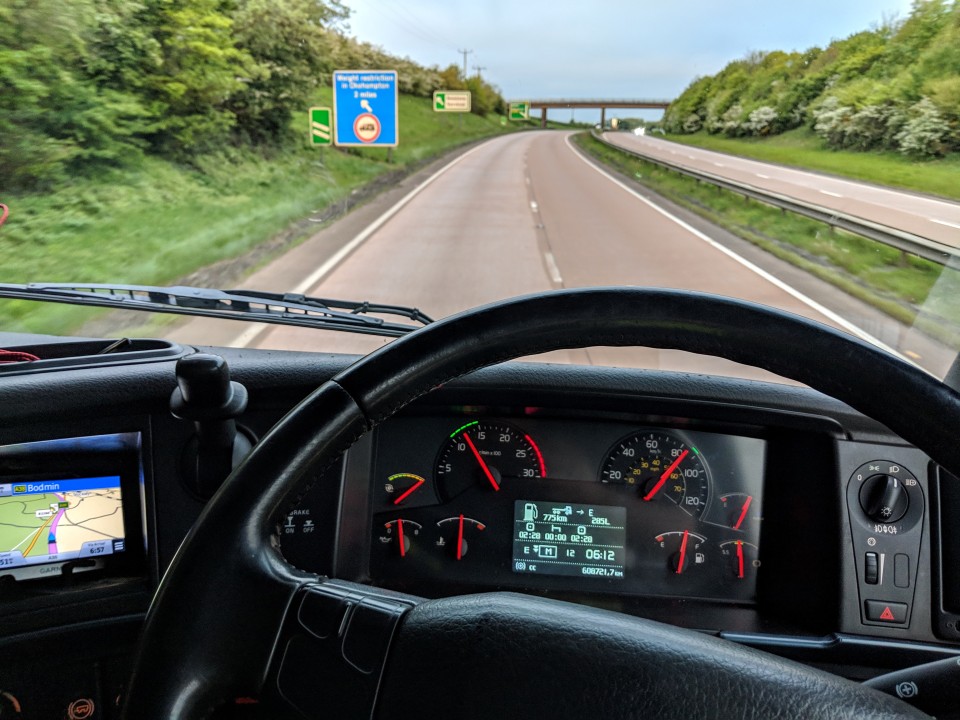
Susie Jones
Kaip būti sveiku sunkvežimio vairuotoju
Sukurta: 27-08-2024
•
Atnaujinta: 27-08-2024
Sunkvežimio vairuotojo profesija reikalauja daug pastangų, todėl dažnai tenka dirbti ilgas valandas, gyventi sėdimą gyvenimo būdą ir ilgą laiką būti toli nuo namų, o tai dažnai atsiliepia daugelio vairuotojų sveikatai.
Nesveiki įpročiai, tokie kaip greito maisto vartojimas, fizinio aktyvumo stoka ir miego sutrikimai, gali sukelti galimų sveikatos komplikacijų ateityje. Tačiau kaip sunkvežimio vairuotojui išlikti geros formos? Lengviau pasakyti, nei padaryti, bet mes parengėme patarimų sąrašą, kuris padės išlaikyti geriausią formą kelyje.
Šeši geriausi patarimai, kaip išlikti sveikiems kelyje
1.Hidratacija
Paprastas patarimas ir prekė, kurią dažnai laikome savaime suprantamu dalyku, tačiau dauguma sveikatos problemų kyla dėl dehidratacijos. Reguliariai gurkšnodami vandenį arba skvošą visą dieną, iš organizmo pašalinsite medžiagų apykaitos atliekas ir toksinus, būsite energingesni ir žvalesni. Turėdami su savimi pripildomą vandens buteliuką ne tik priminsite, kad turite būti hidratuoti, bet ir tausosite aplinką.
2.Dieta
Po ilgos dienos visi galime susidurti su greito maisto pagunda, tačiau, kaip ir hidratacijos palaikymas, jūsų mityba yra labai svarbi jūsų sveikatai ir jūsų savijautai visą dieną.
Sunkvežimių vairuotojams rekomenduojama valgyti tris-keturis kartus per dieną, du kartus valgant ir du kartus užkandžiaujant arba du kartus valgant ir vieną kartą užkandžiaujant. Stenkitės laikytis tokio valgymo ir užkandžių plano, kuriame būtų daug omega-3, geležies ir vitamino C, pavyzdžiui, žalios lapinės daržovės, žuvis ir vaisiai. Venkite dažnai vartojamo maisto ir gėrimų, pavyzdžiui, makaronų, duonos, saldžiųjų gėrimų ir stimuliuojančių medžiagų, tokių kaip kava ir energiniai gėrimai.
Peržiūrėkite mūsų sveikų užkandžių, kuriuos galite turėti kabinoje, sąrašą:
Granolos batonėliai
Energetiniai batonėliai
Popkornai
Riešutai
Džiovinti vaisiai
Juodasis šokoladas
Be to, kad keliaujant galima ne tik įsigyti sveiko maisto, bet kartais sveikiau ir ekonomiškiau ruošti maistą. Frieghtech pateikia puikių receptų, padėsiančių išlaikyti sveiką mitybą darbo metu.
3.Miegoti
Dėl darbo pobūdžio sunkvežimio vairuotojui gali būti sunku pakankamai išsimiegoti, o tai gali turėti pražūtingų pasekmių visiems kelyje.
Paprasti patarimai ir gudrybės, pavyzdžiui, šie patarimai ir gudrybės, gali padėti jums gerai išsimiegoti:
Sukurkite kabinoje aplinką, kurioje jaustumėtės kaip namie. Peržiūrėkite mūsų straipsnį apie tai, kaip sunkvežimio kabiną paversti namais
Laikykite miego zoną tamsią
Karštas dušas: Naudokitės mūsų žemėlapių puslapiu, kad sužinotumėte, kuriose sunkvežimių stotelėse yra tokia galimybė.
Išbandykite kelias programėles, padedančias miegoti
Raskite idealią vietą, kur galėtumėte pastatyti automobilį, kad nekeltų triukšmo ir netrukdytų. Mūsų "intruck" programėlėje rasite 5 000 sunkiųjų krovininių transporto priemonių (HGV) stovėjimo vietų visoje Europoje, iš kurių galėsite rinktis, o mūsų SNAP Access and Security komanda gali pasiūlyti individualius saugumo sprendimus, kad galėtumėte ramiau miegoti žinodami, jog jūs ir jūsų sunkvežimis esate saugūs.
4.Pratybos
Vienas iš sunkiausių patarimų, kurių sunku laikytis kelyje, tačiau vis dėlto jis yra svarbus. Ilgos sėdėjimo valandos per dieną gali lemti blogą laikyseną, nugaros skausmus ir galimas sveikatos komplikacijas. Po ilgos dienos prie vairo gali kilti pagunda sėdėti ir atsipalaiduoti, tačiau trumpa 15 minučių veikla, pavyzdžiui, pasivaikščiojimas ar tempimas, gali padėti atsigauti ir jaustis mažiau įsitempusiems.
HMD Trucking pateikiama keletas naudingų pratimų, pritaikytų sunkvežimių vairuotojams, jei norite į savo kasdienybę įtraukti kelių rūšių fizinius pratimus.
5.Vitaminai
Būnant kelyje visą darbo dieną gali būti sunku gauti visų reikalingų vitaminų. Kiekvieną dieną vartojant po multivitaminą galima sustiprinti imuninę sistemą ir padėti išlikti sveikiems.
6.Psichikos sveikata
Žinome, kad kelyje svarbu rūpintis fizine sveikata, tačiau kiek laiko sunkvežimių vairuotojai skiria savo psichinei sveikatai?

Psichikos sveikatos labdaros organizacija "Mind" paskelbė statistinius duomenis, iš kurių matyti, kad 30 proc. su darbu susijusių ligų transporto ir logistikos pramonėje kyla dėl nerimo, vienatvės, streso ir depresijos. Jie taip pat užsiminė, kad šis skaičius gali būti didesnis, nes dauguma žmonių nesikreipia reikiamos pagalbos. Be to, 95 proc. nedarbingų žmonių nenurodo tikrosios neatvykimo į darbą priežasties, jei ji susijusi su jų psichikos sveikata.
Vadovaudamiesi pirmiau pateiktais patarimais ir gudrybėmis, galite teigiamai paveikti savo psichinę sveikatą. Be to, svarbu atvirai ir sąžiningai kalbėtis su kitais sunkvežimių vairuotojais, vadovais ar dispečeriais.
Ar pratimai gali padėti jums tapti geresniu vairuotoju?
Sveikas gyvenimo būdas ne tik gerina psichinę sveikatą, bet ir rodo, kad dėl jo galite tapti geresniu vairuotoju. Atliktas tyrimas parodė, kad vairuotojai, kurių buvo paprašyta kasdien mankštintis, nurodė, kad jiems lengviau pasukti galvą, jie galėjo toliau pasukti kūną ir greičiau įsėsti į automobilį.
Kas sunkiausia dirbant sunkvežimio vairuotoju?
Ilgos darbo valandos yra vienas sunkiausių sunkvežimio vairavimo aspektų. Sunkvežimių vairuotojams dažnai tenka įveikti daug kilometrų ir dirbti antisocialiai. Šie ilgi kilometrai ir asocialus darbas gali lemti nesveiką gyvenimo būdą.

Kaip nesveika būti sunkvežimio vairuotoju?
Dėl daugelio sunkvežimių vairuotojų gyvenimo būdo vidutiniškai jie statistiškai dažniau turi sveikatos problemų, palyginti su kitų profesijų žmonėmis. Sunkvežimių vairuotojai dažnai susiduria su keliomis kliūtimis, tokiomis kaip ankštos darbo vietos, stresinės situacijos, neįprastas miego režimas ir maistingo maisto trūkumas, kurios turi įtakos jų sveikatai.
Sunkvežimio vairuotojo sveikas gyvenimo būdas reikalauja sąmoningų pastangų, tačiau jų nauda yra to verta. Aukščiau pateikti patarimai leis jums kontroliuoti savo sveikatą ir pagerinti savijautą. Laukite daugiau mūsų SNAP patarimų ir gudrybių.



